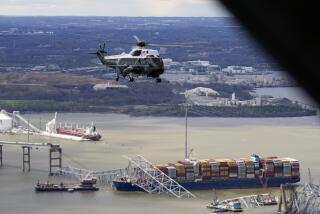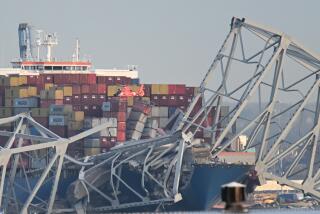Mine Injures GI in Bosnia; Bridge Is Delayed Again
- Share via
ZUPANJA, Croatia — The U.S. Army on Saturday suffered its first casualty of the controversial American troop deployment into the Balkans when a Humvee transport vehicle hit a land mine while patrolling in the northern part of Bosnia-Herzegovina.
There were indications that the patrol may have strayed into an unauthorized area that was known to be mined.
The wounded soldier, identified as Spc. Martin John Begosh, 23, of Rockville, Md., was evacuated by helicopter to an Army field hospital near this Sava River town where he later underwent surgery. He was in stable condition late Saturday evening.
The incident was part of what was a frustrating day for American soldiers who will eventually make up one-third of the NATO-led Implementation Force of 60,000 troops dispatched to the region to enforce a fragile peace.
Here in Zupanja, Army engineers failed to meet their vow of completing a complex but crucially important pontoon bridge across the Sava River by midafternoon Saturday.
That vow--made Friday by the commander of American forces in Bosnia, Maj. Gen. William L. Nash, when he told troops at the bridge construction site, “I will cross the river tomorrow”--came after long weather-related delays and the indignity of being flooded out of a tent camp established on the northern bank of the Sava.
But additional flooding and darkness ended the attempt to complete the span and left Nash once again talking about “tomorrow.”
The land-mine incident reportedly occurred during a reconnaissance patrol near the northern Bosnian village of Bijela and involved members of the 127th Military Police Company.
Military officials said the injured soldier remained fully conscious but suffered an abdominal wound as well as cuts on his legs and feet. He also broke a leg and a bone in his heel.
The soldier was believed to be leading a military convoy of four Humvees that had entered the politically volatile Posavina Corridor. The convoy was accompanying psychological operations experts who were alerting area residents that U.S. troops would soon arrive.
Although the convoy had permission to travel main routes that are deemed clear of mines, it is believed to have had no authorization to drive on the secondary road where the mine was hit.
Military officials were still trying to piece together the events leading up to the incident.
*
While initial reports remain sketchy, officials said there is reason to believe that local residents may have tried to warn the convoy and that their efforts were misunderstood.
Word of the incident spread quickly among the 3,000 troops stationed here, generating an uneasiness among some soldiers, while others resolved to be more vigilant.
“You can’t stop the operation because of one casualty,” said 1st Lt. Erik Zikos, a New York native who joined the Army nearly four years ago. “It’s the nature of the business.”
Begosh’s mother, Judy, said from her Rockville home that she was relieved her son’s condition was stable, but she now wants him to leave the Army, come home “and get a real job.”
She said when she learned her son would be sent to Bosnia, “I told him . . . to watch his back, to be sure to stay on the road and be very careful.”
In Washington, President Clinton talked about the difficulty of clearing up the mines planted during the war.
“Mines have always been our biggest concern, and we’re working very hard on it,” he told reporters before he met with congressional leaders in budget negotiations. “We’ll continue to monitor it and do the best we can.
“The mission itself,” he went on, “is going very well. The people have received our soldiers very well, and I’m very well-satisfied with the progress.”
The president’s optimistic comments came despite further delays in completing the Sava River bridge, which will provide the final link in an 800-mile land route from U.S. bases in Germany to areas of northeastern Bosnia that form the American sector of responsibility in enforcing the Balkan peace accord.
The majority of the 20,000 U.S. troops destined for duty in Bosnia will cross the bridge.
“From the very beginning, we decided this was going to be a measured, deliberate deployment, and that’s still on,” Nash said after it became clear that the bridge would not be finished Saturday. “The overriding goal will be to do a safe, organized crossing of the river. If that doesn’t happen until tomorrow, then so be it.”
The importance of the crossing was underscored Saturday by the presence of three U.S. Army generals, including George Joulwan, the supreme commander of North Atlantic Treaty Organization forces.
Joulwan’s visit to the bridge seemed partly aimed at boosting morale among troops whose work has been slowed by heavy snow and freezing temperatures, then by flooding and acres of knee-deep mud.
“We’ve got momentum going now,” he said, looking down at the bridge-building activities.
But it was clear that the generals’ presence also reflected a growing sense of urgency to finish the bridge quickly.
Moving the Implementation Force into place rapidly has long been viewed as a key to successful enforcement of the agreement.
Times staff writer Stanley Meisler in Washington contributed to this report.
More to Read
Sign up for Essential California
The most important California stories and recommendations in your inbox every morning.
You may occasionally receive promotional content from the Los Angeles Times.










